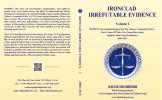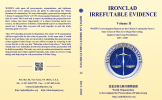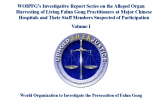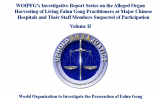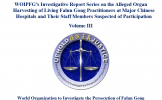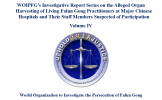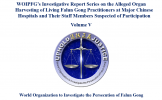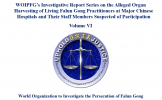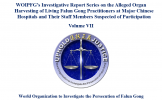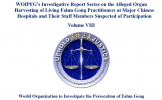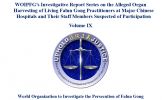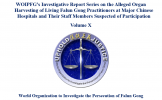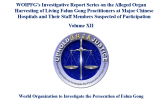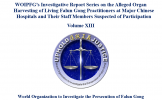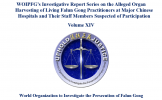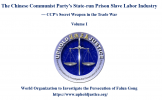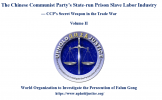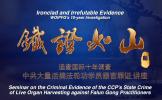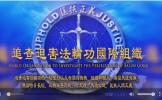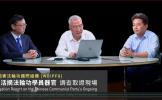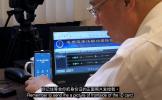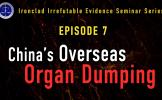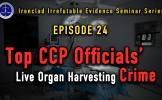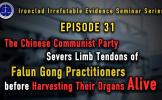Investigative Report: Chinese Communist Party Interfering with Chinese Falun Gong Practitioners’ Asylum-Seeking Process in South Korea
Foreword
I. The CCP uses diplomatic relations with South Korea to interfere with Chinese Falun Gong practitioners’ application for asylum in South Korea.
1. Two weeks after China’s Minister of Public Security met with South Korea’s Minister of Justice, 21 Falun Gong practitioners’ applications for refugee status were rejected.
2. Around a key CCP official’s visit to South Korea in 2009, the country’s Ministry of Justice rejected 43 Falun Gong practitioners’ applications for refugee status and 64 applications of appeal. They also deported one Falun Gong practitioner back to China.
II. South Korean ministries involved in the asylum process issue judgments based on the CCP’s falsified reports and contorted statements.
1. CCP set up conspiracies to defame Falun Gong.
2. Violent brainwashing masked as “education.”
3. Fake NGO established to slander Falun Gong.
III. The CCP has extended the persecution of Falun Gong practitioners to South Korea.
1. Chinese Falun Gong practitioners who sought refugee status in South Korea were secretly sent back to China.
2. Chinese Falun Gong practitioners without asylum status in South Korea are facing the danger of being arrested and deported.
3. Reactions from the international community.
Conclusion
References
Appendix 1: What Really Happened after I Was Deported from South Korea to China
Appendix 2: Falun Gong Practitioner Deported from South Korea is Persecuted after Returning to China
Appendix 3: Recorded Phone Calls with Two Deported Falun Gong Practitioners
Appendix 4: Letter from 23 US Congress Members to President Lee Myung Bak
Appendix 5: Letter of Edward McMillian-Scott to President Lee Myung-bak
Foreword
Since 2002, about 100 Chinese Falun Gong practitioners have submitted applications for political asylum to the Ministry of Justice in South Korea. However, up to now, none had been granted asylum by the Ministry of Justice. All of these practitioners filed applications of appeal in court, but only two eventually won their cases, while the others failed.
From 2009 to 2011, 10 Falun Gong practitioners who had applied for political asylum in South Korea were forcibly deported back to China. Two of them subsequently fled from China and exposed in the media their experience of being persecuted after being deported. Currently, there are at least 56 Chinese Falun Gong practitioners in South Korea without asylum.
The World Organization to Investigate the Persecution of Falun Gong (WOIPFG) has conducted an investigation into the situation pertaining to the political asylum claims of Falun Gong practitioners in South Korea. The results of this investigation show that the Chinese Communist Party (CCP) has been exerting influence on the South Korean government with regard to the treatment of Falun Gong refugees.
I. The CCP uses diplomatic relations with South Korea to interfere with Chinese Falun Gong practitioners’ application for asylum in South Korea.
1. Two weeks after China’s Minister of Public Security met with South Korea’s Minister of Justice, 21 Falun Gong practitioners’ applications for refugee status were rejected.
On March 16, 2006, South Korean Minister of Justice Pei Chun Jung accepted the invitation of the Chinese Ministry of Public Security and visited China. Pei Chun Jung and China’s Minister of Public Security Zhou Yongkang held a talk in Beijing’s Great Hall of the People.
According to Zhou Yongkang, the meeting aimed “to strengthen exchanges and cooperation in combating bilateral crimes, immigration management, event security and other fields [1]”
Pei Chun Jung stated: “Korea focuses on cooperation with China. South Korea’s Ministry of Justice is willing to consolidate and develop cooperation with China’s Ministry of Public Security in the field of law enforcement.” After the talk, they signed the document called “China Ministry of Public Security and South Korea Ministry of Justice talking record [2]”
Zhou Yongkang served as Minister of Public Security of China, as well as Secretary of the CCP’s 610 Office, an agency specializing in suppressing Falun Gong. He was thus responsible for all of China’s public security systems used to persecute Falun Gong [3]
On March 31, 2006, two weeks after Zhou Yongkang’s meeting with Pei Chun Jung in Beijing, the South Korean Ministry of Justice rejected the asylum applications of 21 Chinese Falun Gong practitioners. On September 29, 2006, 11 Falun Gong practitioners’ applications were also rejected.
2. Around a key CCP official’s visit to South Korea in 2009, the country’s Ministry of Justice rejected 43 Falun Gong practitioners’ applications for refugee status and 64 applications of appeal. They also deported one Falun Gong practitioner back to China.
In early April 2009, Li Changchun, a member of the CCP’s Politburo Standing Committee, visited South Korea. On April 6, he met with South Korean President Lee Myung-bak [4] and Prime Minister Han Seung-soo [5] in Seoul. Li Changchun stressed the strengthening of friendly relations between South Korea and China [6]
On March 18, 2009, two weeks before Li Changchun’s visit to South Korea, the country’s Ministry of Justice rejected refugee claims of 43 Chinese Falun Gong practitioners. Most of these applications had been submitted in 2005, but no reply was granted at the time. Yet four years later, just prior to Li Changchun’s visit, the applications were rejected by South Korea's Ministry of Justice.
On April 30, 2009, less than a month after Li Changchun’s visit to South Korea, the country’s Ministry of Justice also rejected 41 Falun Gong practitioners’ applications for asylum, as well as 23 practitioners’ applications of appeal.
China’s Politburo has labeled Falun Gong as one of “five hostile forces.” Li Changchun had confirmed so in a vice-ministerial-level meeting of various state organs. [7]
On February 26, 2009, 32 Falun Gong practitioners’ appeals for refugee status were dismissed. This group faced the danger of deportation to China at the time. In March 2009, the “Falun Gong Against Forced Repatriation-Refugee Countermeasures Committee” launched a signature campaign. Eleven South Korean Members of Parliament, as well as all members of 130 local councils, signed to oppose the South Korean government’s forced repatriation of Falun Gong practitioners.
Nevertheless, on July 1, 2009, three months after Li Changchun’s visit to South Korea, the country’s Ministry of Justice forcibly repatriated Falun Gong practitioner Wu Qilong, who had applied for a refugee status in South Korea. Upon arriving in China, he was quickly arrested by the national security personnel and persecuted.
Wu Qilong eventually fled from China and exposed how he had been illegally detained, tortured, subjected to brainwashing, placed under surveillance, harassed and forced to help the CCP falsify the news.
He was abducted by China’s national security agents and taken to a hotel, where four men took turns interrogating him in an attempt to gather information about Falun Gong practitioners in South Korea. He was forced to undergo brainwashing, his home phone was tapped, and he was ordered to call South Korea and lie to Falun Gong practitioners there that he had not been arrested. He was also forced to tape an interview for a South Korean TV program, telling the outside world that he lived very well and freely in China [8] (see Appendix 1).
South Korea’s Ministry of Justice had rejected Wu Qilong’s refugee claim based on reasoning that there would be no danger and he would not be persecuted upon returning to China. Wu Qilong subsequently wrote: “From my conversations with state security officers, I have learned that they have comprehensive information on overseas Falun Gong followers. If you have participated in any activities, you face the danger of persecution [9]” He has been granted asylum by the United Nations.
On July 28, 2009, two more Falun Gong practitioners were deported back to China. On January 29, 2010, another Falun Gong practitioner, Yin Xiangzi, was also repatriated. This was the third case of Falun Gong practitioners’ deportation from South Korea back to China. Like Wu Qilong, Yin Xiangzi was also persecuted by the CCP, but eventually escaped from China and obtained a refugee status from the United Nations.
She subsequently disclosed to the world how, after being deported back to China, she was interrogated continuously for 72 hours twice, deprived of sleep, and forced by police to write a guarantee statement that she would no longer practice Falun Gong. In addition, she was ordered to spy for the CCP [10] (see Appendix 2). In a statement to WOIPFG, Yin said that her husband is a South Korean national (they got married after she was deported back to China) and that she had a visa to enter Korea on her passport, which was confiscated by the Chinese police. Therefore, she wasn’t able to return to South Korea, but had to escape to a third country.
Between July 1, 2009, and July 20, 2011, South Korea's Ministry of Justice repatriated 10 Chinese Falun Gong practitioners who had applied for a refugee status in South Korea. As of November 2013, 56 Falun Gong practitioners who were not granted asylum still remained in South Korea.
South Korea is a Signatory state to the United Nations Convention on the Status of Refugees and Convention Against Torture. Paragraph 1 of Article 33 of the United Nations’ Convention on the Status of Refugees states: "No Signatory state shall expel a refugee in any manner or return him (push back) to his own borderland that threatens his life because of his race, religion, nationality, participation in any social group or holding any political thought [11]”
Article III of the United Nations Convention Against Torture points out: “If there is sufficient reason to believe that anybody who will face the risk of torture in another country, any Signatory state shall not expel, return or extradite him to the country [12]”
Since July 1999, a huge number of Falun Gong practitioners have been brutally persecuted by the Chinese communist regime. From March 2006 to the present, the media around the world have exposed in detail one of the CCP’s most atrocious crimes against humanity—organ harvesting from living Falun Gong practitioners for profit. Through years of investigation, the World Organization to Investigate the Persecution of Falun Gong has confirmed the crime’s existence [13]
In 2006, renowned Canadian human rights lawyer David Matas and former Canadian Member of Parliament and Secretary of State for Asia-Pacific David Kilgour concluded through their own investigation that this allegation was substantiated. The data showed that organ harvesting from Falun Gong practitioners was sanctioned by the state in large quantities.
II. South Korean ministries involved in the asylum process issue judgments based on the CCP’s falsified reports and contorted statements.
On January 16, 2008, the Administrative Court of Seoul sent 32 Falun Gong practitioners a written judgment that was based on the CCP’s report dated April 5, 2005, which was issued by the Chinese Embassy of South Korea and contained falsified information about Falun Gong. The case was handled by South Korea’s Ministry of Justice.
In early May 2005, the Ministry of Justice rejected 25 Falun Gong practitioners’ application for refugee status. Among them, 4 had applied in 2002, and the rest in 2004.
Below are several examples of the falsified contents of the CCP’s report.
1. CCP set up conspiracies to defame Falun Gong.
The report of the Chinese Embassy of South Korea listed events such as “deploying poison,” “murder,” and “self-immolation.” In fact, all of these extreme acts were plotted and executed by the CCP to defame Falun Gong.
Example 1: Tiananmen Self-Immolation:
According to the CCP’s report, 5 people had committed self-immolation in Tiananmen Square. At the time, the state mouthpiece Xinhua News Agency immediately announced that they were Falun Gong practitioners. After this, the CCP intensified the persecution and slander against Falun Gong. From April 19 to August 15, 2003, the World Organization to Investigate the Persecution of Falun Gong issued 4 investigative reports. Recorded interviews with relevant individuals and analysis of contradictory reports from the CCP-run media revealed that the Tiananmen self-immolation was a conspiracy set up by the CCP officials at the highest level, with the goal of arousing widespread hatred of Falun Gong [14]
Example 2: “Zhejiang Beggar Murder Case”:
On June 26, 2003, a series of killings of beggars by means of deploying poison occurred in Longgang Village, Cangnan Town, Wenzhou City, Zhejiang Province. The Xinhua News Agency blamed Falun Gong, stating that the killer, Fuzhao Chen, was a Falun Gong follower. Through its independent investigation, the World Organization to Investigate the Persecution of Falun Gong proved that Fuzhao Chen was a psychopath and did not practice Falun Gong. This case was actually manipulated by the CCP’s 610 Office, with the purpose to viciously slander Falun Gong and further mislead the public in order to justify the persecution [15]
2. Violent brainwashing masked as “education.”
The Chinese Embassy of South Korea stated that the CCP “educated” and “helped” Falun Gong practitioners. In fact, the so-called “education” has been done through the means of physical and mental torture in order to “transform” Falun Gong practitioners and make them renounce their belief.
“Transformation” is a term concocted by the CCP; it is commonly referred to as brainwashing in the international arena. Brainwashing is deployed to control people’s minds and exert the persecution of belief. In order to force Falun Gong practitioners to renounce their belief, the CCP established numerous brainwashing classes, disguised under different names, such as Legal System Education Class (also Center or School), Education Transformation Center, Care Center, etc. This report will use these titles interchangeably, based on the source material obtained during the investigation.
Some Falun Gong practitioners were persecuted to death in these brainwashing classes, and many were wounded or permanently handicapped [16]
3. Fake NGO established to slander Falun Gong.
The Chinese Embassy of South Korea mentioned the “China Anti-Cult Association,” which was established on November 13, 2000, commending its anti-cult efforts.
The World Organization to Investigate the Persecution of Falun Gong proved that the “China Anti-Cult Association” (referred to as the “cult association” in this report) is a CCP-backed organization consisting of officials from the scientific and technological community. It hides behind the banner of non-governmental organization (NGO), yet plays a supporting role in the Chinese regime’s persecution of Falun Gong. Its official nature can be confirmed from many aspects, such as its organizational structure, financial sources, and the nature and characteristics of its activities. The purpose of this organization is to mobilize the human, material, and financial resources in the scientific and technological community to assist the government in the crackdown on Falun Gong [17]
III. The CCP has extended the persecution of Falun Gong practitioners to South Korea.
1. Chinese Falun Gong practitioners who sought refugee status in South Korea were secretly sent back to China.
As mentioned in Section I above, on July 1, 2009, three months after CCP’s Politburo Standing Committee member Li Changchun’s visit to South Korea, the South Korean Ministry of Justice secretly deported a Falun Gong practitioner back to China.
Wu Qilong was the first Falun Gong practitioner to be repatriated. He told the World Organization to Investigate the Persecution of Falun Gong: “On July 1, 2009, soon after they started to work in the morning, a security guard told me to come with him. (Mr. Wu was in the South Korean detention facility for the Chinese.) He took me to the squad leader's office. The monitor who was responsible for me told me to go back to China. I said, ‘I cannot go back to China.’ The monitor said: ‘If you don’t go back yourself, we will send you directly to the Chinese public security. So today you must go. You can choose to go yourself or be sent by us directly to the Chinese public security.’ Then they threatened me and asked me to sign the document. They knew that I was reluctant to go back. Therefore, two of them forced me up and escorted me to the airport. They were afraid that people could see me handcuffed, so they wrapped my hands with clothes until I got through customs.”
Ms. Xiangzi Yin, who was also secretly repatriated, told the World Organization to Investigate the Persecution of Falun Gong: “On January 29, 2010, around 11 or 12 p.m., after lunch, someone told me to quickly pack. (Ms. Yin was in the South Korean detention facility for the Chinese.) I asked them: ‘Where would you let me go?’ They said that they would let me go to Seoul (Immigration Office in Seoul). I was very glad. People around me were also happy that I could get out from there. They took me to change clothes. After I changed clothes and came out, they asked me to sign a document. I asked, ‘Why do I need to sign?’ They replied, ‘Sign it.” I just put down my signature. Directly after I signed it, they said to me, ‘You have to go back to China.’ I said, ‘How can you treat me like this?’ They said: ‘Don’t say anything. We will secretly send you back. You will not be in danger.’ When I was brought to the Pier of Incheon, they handcuffed me. During the whole process, they cheated me. ”
One Falun Gong practitioner in South Korea called two practitioners, Ms. Li and Ms. Wang, who had been deported back to China. She recorded the phone calls and provided these recordings to the World Organization to Investigate the Persecution of Falun Gong (see Appendix 3).
When Ms. Li was in the South Korean detention facility for the Chinese, she was called out. She saw more than 20 people from the Ministry of Justice and the police standing there. They told her that they would send her back to China that day, telling her that this was the order from the South Korean government. The other two Falun Gong practitioners were also scheduled to be deported that day. Ms. Li was ordered to quickly change clothes. Then she was forcibly taken to a waiting car. The other two practitioners were already sitting there. They were secretly brought to the pier and taken directly to the cabin. Their Falun Gong books were left behind, to avoid being detected when crossing the border (see Appendix 3).
Ms. Wang was also sent out from the South Korean detention facility for the Chinese. Two people gripped her on each side and brought her to the entrance of the locker room, which was full of people, including security guards and doctors. Ms. Wang was told that she would be deported back to China. She told them that she could not leave due to pending litigation. Someone replied that she must leave South Korea. They forced her to put on some clothes. When Ms. Wang said that she could not return to northeastern China because she would be persecuted, they told her that they had booked her a ticket to southern China. They locked her in a room. She was not allowed to call her family. Finally, she was put on a ship traveling to the northeast of China (see Appendix 3).
2. Chinese Falun Gong practitioners without asylum status in South Korea are facing the danger of being arrested and deported.
Jingzhe Jin is a Chinese Falun Gong practitioner living in South Korea. In January 2008, he participated in several activities there to protest the CCP’s persecution of Falun Gong. He was a conductor of the Tianguo Marching Band, composed of Falun Gong practitioners, and had a lead role in the movie “Reincarnation.”
Jingzhe Jin submitted a refugee claim in February 2008, but it was rejected by the South Korean Ministry of Justice. The ministry rejected it on the grounds that he was not the main person responsible for the Falun Gong activities and thus would not be persecuted if sent back to China. Between 2009 and February 2011, Jingzhe Jin appealed to the South Korean Administrative Court, High Court, and Supreme Court. All of these appeals were rejected for the same reason.
On September 6, 2011, two staff members from the Ministry of Justice and two police officers knocked on Jingzhe Jin’s door and forcibly took him into custody. He was detained at the immigration office and taken to the South Korean detention facility for the Chinese the next day.
Under international pressure, the South Korean government accepted a new asylum application from Jingzhe Jin on December 6, 2011. However, on July 30, 2012, it again rejected his application. Jingzhe Jin filed an application for appeal. The ministry reviewed it on May 2, 2013. Under increasing international pressure, the ministry gave Mr. Jin “humanitarian stay.” On July 3, 2013, Mr. Jin was released but his asylum application was again refused.
3. Reactions from the international community.
In early July 2009, the South Korean government’s forced repatriation of Falun Gong practitioners attracted widespread international attention. Both European and American dignitaries, together with international media, condemned the CCP for applying pressure on the South Korean government to deport Chinese Falun Gong practitioners back to China. They also demanded that the South Korean government comply with the United Nations Convention on the Status of Refugees and the United Nations Convention against Torture, ceasing repatriation and giving political asylum to Falun Gong practitioners.
For example, on August 14, 2009, U.S. Congressman Chris Smith, together with 23 Members of Congress, sent a letter to South Korean President Lee Myung-bak [18] (see Appendix 4). European Parliament Vice President Edward McMillian-Scott also sent a letter to the South Korean government and President Lee Myung-bak (see Appendix 5). On September 11, 2011, Agence France-Presse (AFP) published report titled "Falun Gong Practitioners Facing the Danger of Being Repatriated in South Korea" [19]
During the time when Jingzhe Jin was detained in the South Korean detention facility for the Chinese and under threat of being sent back to China, U.S. Congresswoman Ileana Ros-Lehtinen, then-chair of the Committee on Foreign Affairs in the U.S. House of Representatives, submitted a copy of U.S. House Resolution 605 condemning the persecution of Falun Gong. She also submitted a letter to South Korean President Lee Myung-bak during his visit to the U.S. in mid-October 2011. She noted that on October 5, 2011, South Korean Foreign Minister had publicly urged China not to forcibly repatriate 35 North Korean refugees in China; however, in stark contrast, the South Korean government deported 10 Chinese Falun Gong practitioners back to China. She called on the South Korean government not to repatriate Falun Gong practitioners, since they would face torture and may even be killed by the CCP [20]
The Wall Street Journal reported in its section titled “Korea Real Time” that “Jingzhe Jin will be repatriated [21]” It also reported in the “China Real Time” section that “the Ministry of Justice and Justice Department deputies said they were not allowed to discuss Mr. Jin’s case [22]”
Conclusion
Under the pretense of strengthening friendly relations and cooperation between China and South Korea, the CCP took advantage of high-level officials’ visits between the two nations to pressure the South Korean government not to grant asylum to Chinese Falun Gong practitioners living in South Korea. As a result, a large number of Falun Gong practitioners’ refugee claims and applications of appeal were rejected.
Under the pressure from the CCP, the South Korean government also detained Chinese Falun Gong practitioners who sought asylum in South Korea and forcibly deported them back to China. These practitioners were then severely persecuted by the CCP.
In these ways, the South Korean government allowed the CCP’s persecution of Falun Gong to extend to South Korea. In addition, their actions resulted in serious violation of the United Nations International Conventions.
References:
[1] China News, March, 18, 2006. "Public Security Minister Zhou Yongkang held talks with South Korean Minister of Justice," http://news.163.com/06/0318/16/2CGRJHUC00011EOM.html (Back)
[2] China News, March, 18, 2006. "Public Security Minister Zhou Yongkang held talks with South Korean Minister of Justice," http://news.163.com/06/0318/16/2CGRJHUC00011EOM.html (Back)
[3] People’s Public Security News, December 9, 2002. "Ministry of Public Security Zhou Yongkang gave speech at the meeting for people responsible for each bureau-level" (Back)
[4] CCP’s Central Government Portal, April, 6, 2009. Xinhua News Agency reported that "Li Changchun met with Lee on the development of China-ROK relations, in-depth exchange of views," http://www.gov.cn/ldhd/2009-4/06/content_1278785.htm (Back)
[5] Sohu News, April, 6, 2009. "Li Changchun met with South Korean Prime Minister Han Seung- soo," http://news.sohu.com/20090406/n263226661.shtml (Back)
[6] Xinhua.net, April, 7, 2009. "Li met ROK good group leaders," http://news.xinhuanet.com/world/2009-04/07/content_11144406.htm (Back)
[7] Boxun Network, April, 8, 2006. The Politburo confirmed "five hostile forces," http://www.peacehall.com/news/gb/china/2006/04/200604081252.shtml (Back)
[8] Minghui.org, February, 13, 2013. "What Really Happened after I Was Deported from South Korea to China," http://en.minghui.org/html/articles/2013/3/3/138354.html (Back)
[9] Minghui.org, February, 13, 2013. "What Really Happened after I Was Deported from South Korea to China," http://en.minghui.org/html/articles/2013/3/3/138354.html (Back)
[10] Minghui.org, February, 11, 2013. "Falun Gong Practitioner Deported from South Korea is Persecuted after Returning to China," http://en.minghui.org/html/articles/2013/3/4/138364.html (Back)
[11] United Nations’ Convention on the Status of Refugees, http://www.un.org/chinese/hr/issue/docs/82.PDF (Back)
[12] United Nations’ Convention Against Torture, http://www.un.org/chinese/hr/issue/docs/39.PDF (Back)
[13] World Organization to Investigate the Persecution of Falun Gong. "Tracing the evidence of the CCP’s organ harvesting from living Falun Gong practitioners," http://www.zhuichaguoji.org/node/35848 (Back)
[14] World Organization to Investigate the Persecution of Falun Gong, January 20, 2011. "International investigation of the ‘Tiananmen self-immolation’ hoax," http://www.zhuichaguoji.org/node/12180 (Back)
[15] World Organization to Investigate the Persecution of Falun Gong, January 15, 2004. "International investigation of the ‘Zhejiang beggar poisoning case,’" http://www.zhuichaguoji.org/node/66 (Back)
[16] World Organization to Investigate the Persecution of Falun Gong, April, 28, 2004. "Investigative report on the ‘transformation’ of Falun Gong practitioners," http://www.zhuichaguoji.org/node/123 (Back)
[17] World Organization to Investigate the Persecution of Falun Gong, April, 5, 2004. "Investigative report on the Secretary-General of ‘China Anti-Cult Association’ Wang Yusheng’s Involvement in the Persecution of Falun Gong," http://www.upholdjustice.org/node/228 (Back)
[18] Epoch Times, September 6, 2009. Chinese translation, http://www.epochtimes.com/gb/9/9/6/n2648288.htm (Back)
[19] AFP, September, 16, 2011. "Falun Gong practitioners facing the danger of being repatriated in South Korea," http://sg.finance.yahoo.com/news/Falungong-members-S-Korea-afpsg-2760865651.html (Back)
[20] Epoch Times, October 23, 2011. Chinese translation of the letter, http://www.epochtimes.com/b5/11/10/23/n3409046.htm (Back)
[21] Wall Street Journal, September, 20, 2011. "Protests Grow Over Deportations of Falun Gong Practitioners," http://blogs.wsj.com/korearealtime/2011/09/20/protests-grow-over-deportations-of-falun-gong-practitioners (Back)
[22] Wall Street Journal, September, 20, 2011. "South Korea Protests Over Falun Gong Deportations," http://blogs.wsj.com/chinarealtime/2011/09/20/south-korea-protests-over-falun-gong-deportations (Back)
Appendices
Appendix 1: What Really Happened after I Was Deported from South Korea to China
(from Minghui.org)
I am from China, and my name is Wu Qilong. I am a Falun Gong practitioner. I was deported from South Korea and taken back to China on July 1, 2009. I subsequently endured illegal detention, brainwashing, surveillance, and harassment. The state security officers carried out this persecution. I was also forced to cooperate with them in fabricating news reports. I would like to clarify the facts surrounding my situation after I was deportated from South Korea to China.
I learned about and started practicing Falun Gong in Korea in 2004. From March 14, 2007, to July 1, 2009, I was held at the Huacheng Foreigners Custody Agency in South Korea because of my undocumented status. During that time, I filed three applications for refugee status. All three were denied on the grounds that I faced no danger if I returned to China. As a result, I was deported to China on July 1, 2009.
The state security officers quickly located me. They showed me their identification cards and told me, "Originally, the police were planning to arrest you, but because you returned from a foreign country, we took over." The fact was that there was pressure from the international community. The authorities had to resort to a different approach in carrying out the persecution against me. The officers kept harassing me, making phone calls every day, frequently visiting me at my workplace, and harassing me and my family at my home. They also monitored my family's phone communications. I was also subjected to brainwashing.
One day the state security officers held me in a hotel room. They ordered me to read an article that slandered Master Li Hongzhi. I pushed the article aside. They put it in front of me to force me to read it. The four officers took turns interrogating me, one after the other, so that I never got a break. After a while I couldn't bear it and asked to go to the restroom to get a moment of relief. Even then, they dispatched someone to monitor me when I was using the restroom and to take pictures of me. Throughout the day, my family kept calling me. I could not bear the torment and insisted that I be allowed to go home. At the end of the day, a head of the 610 Office shouted at me, "Wu Qilong, stop playing tricks with us. There is no escape for you!" (I later learned that I had been on their blacklist.)
After I returned home, I had a fever and started hearing things. I could not fall asleep all night long. The next morning, I felt something warm flowing out of my ear. It turned out to be blood. After that, my memory started to deteriorate. People sometimes had to repeat themselves several times before I could catch it. In the hotel room, I ate and drank what they gave me while they were trying to brainwash me. I suspected that they put something in my food and drink. When the state security officers came to look for me again, I told them about my symptoms. They replied, "It was not us." They also ordered me to write down the details of how I came to learn Falun Gong, the names of other Falun Gong practitioners that I knew, and who were the primary persons in charge and where they lived. They also ordered me to make phone calls to Falun Gong practitioners in South Korea to report that I was "safe." They also frequently coerced me to do what they wanted by threatening to harm my family. The officers took a picture of me and my wife, saying that it was only to be shown within the South Korean government.
It was not until later that I learned that they made up a story based on this picture. They fabricated a tale that someone I knew only online was my colleague. This "colleague" stated that reports online about my deportation differed from the facts. He went on to claim that he went on a trip to the suburbs with me and my wife and had firsthand information. He then said that he had taken the picture on that trip to the suburbs, and he was glad to post it online. It was a complete lie. Another outright lie in the person's online post is that he claimed to have asked me, "Were you persecuted by the Chinese regime on both occasions when you came back to China?" The fact is, after I left for South Korea in 2002, I never returned to China until I was deported back in 2009.
It could be that they were aware of the pressure from the international community. The state security officers held back any information about how I was under the Chinese Communist Party's surveillance and was being brainwashed. At the same time, they were producing false reports to prove that I lived quite well in China, without restrictions. The state security officers coerced me to meet reporters from South Korea several times. At first they said I was to meet those from KBS television station. Later, reporters from South Korean Chinese Compatriots News, a media I had never heard of, conducted the interview. The state security officers threatened me with the safety of my child. They told me to be careful about what I said, and to "think about my child." In other words, I had to say what they told me to say.
They also said, "Not a single word you say to the reporters can be smuggled out by the reporters." On the day of the interview, they drove me to a place near the hotel and dropped me off so that I could walk to the hotel on my own. They told me to look natural. This was the background of my interview with reporters from South Korean Chinese Compatriots News. Here I would like to tell those reporters about the cell phone number through which they reached me: "You may think someone in the Chinese regime could have had my number, and they gave it to you. In fact, I did not have a cell phone at that time. The state security officers ordered me to carry my wife's cell phone with me at all times so that they could reach me around the clock. That was how they had my number."
From my conversations with state security officers, I have learned that they have comprehensive information on overseas Falun Gong followers. If you have participated in any activities, you face the danger of persecution. I was not able to and dared not say anything before because I was under constant surveillance and was being harassed, held in custody, and brainwashed. It is fortunate that I have escaped from China and am now able to set the record straight and tell what really happened.
I hereby appeal to the South Korean government: "For humanitarian reasons, do, by all means, offer political asylum to Falun Gong practitioners. The persecution of Falun Gong in China has not ended. I hope that no Falun Gong practitioner will ever be deported again."
Appendix 2: Falun Gong Practitioner Deported from South Korea is Persecuted after Returning to China
(from Minghui.org)
My name is Yin Xiangzi. I am a Falun Gong practitioner who was deported from the Republic of Korea back to China on January 30, 2010. After I was back in China, State Security agents illegally searched my home, placed me under surveillance, brainwashed me, and otherwise harassed me. After many twists and turns, I have escaped from China. I would like to publicize my personal experience and expose the evil nature of the Chinese Communist Party (CCP).
I started practicing Falun Gong in 1997, after being introduced to the practice by my neighbor. I was in poor health at the time, and for years I had suffered from an ovarian tumor, cervical inflammation, arthritis, insomnia, and other illnesses. My health improved greatly within just one month of practicing Falun Gong. Symptoms of all the above illnesses disappeared.
I went to South Korea on a business trip in March 1999. On July 20 of that year, the CCP launched a nationwide persecution against Falun Gong. I decided to stay in South Korea so I could freely continue my practice of Falun Gong, and I applied for refugee status. In the end, my application did not go through, and I lost my legal status. The South Korean government deported me back to China on January 30, 2010.
After returning to China, I did not dare to go home. I went to a relative's home in Qingdao City, Shandong Province. I had no identification cards to prove my identity, as they were all lost. After a month, I decided to go back to my hometown in Yanji City, Jilin Province to apply for a residential ID card and a passport. This brought back sad memories of those years of misery and uncertainty, and I decided to request a name change while applying for the new ID card and passport.
Despite my name change and hiding at my relative's home out of town, the police still located me. On August 25, 2010, officers from the Qingdao City Police Department suddenly broke in. They searched my home and took a copy of Zhuan Falun, an MP3 player, and cassette tapes. They said I was needed for interrogation, and they forcibly took me into custody. Police officers from Yanji City came to Qingdao City for the interrogation, which lasted 72 hours, non-stop. They confiscated my identification cards. Someone from the Yanji State Security Department threatened that if I remained in Qingdao, my issues would get rather complicated. They demanded that I return to Yanji City to resolve all the issues. They said that the resolution depended on my attitude. They then left Qingdao.
Under this pressure, I returned to Yanji on September 30, where I was again interrogated for 72 hours. The police also brought in a former pracitioner who had been deceived by the CCP to brainwash me. This person was sharp, cold, and calculating. He kept pouring his devious interpretation of Falun Gong into my mind. By then, I had had almost no sleep for 72 hours, and did not have a clear mind. I signed a guarantee statement promising that I would no longer practice Falun Gong. Then I was released. They demanded that I report to them before I went anywhere. They also started monitoring my phone. I realized then the severity of the CCP's persecution.
During the two 72-hour interrogations, I found out that the CCP police system had extensive knowledge about Falun Gong practitioners in South Korea. They mentioned on various occasions, the names of numerous coordinators in South Korea as well as names of several practitioners who went to South Korea from Yanji City. They asked me whether I knew them.
They showed me a photograph of the South Korean Divine Land Marching Band taken in a parade. I noticed that I was in the picture. They asked me to identify Falun Gong practitioners in the photo. They also showed me a list of Falun Gong practitioners who engaged in activities that helped practitioners to be granted refugee status. CCP special agents even visited my Falun Gong practice site in South Korea. They later asked whether I knew that
Falun Gong practitioner Xu Yuanzhong had also been arrested in South Korea for his illegal status. I said I did not, because Mr. Xu's arrest took place after my deportation.
After I was released from the interrogations, although I was not imprisoned, I was in extreme misery. Falun Gong not only restored my health, but also gave me a healthy mind. Yet I betrayed Falun Gong against my own conscience. I felt despair, humiliation, and regret.
A month later, I decided that I had to resume practicing Falun Gong, because it had become part of my life. I could not give up practicing. I tried to get in touch with a distant relative who practices Falun Gong. I asked her for Falun Gong books. I published, by signing my real name, a solemn statement on Falun Gong's Minghui website, declaring that all the guarantee statements I signed before were nullified, and that I would start practicing Falun Gong all over again. I also joined the weekly group Fa study at my distant relative's home. A few weeks later, suspicious people frequently showed up for surveillance at my relative's home, and we had to stop the group Fa study. I studied the Fa and practiced Falun Gong exercises at my own home. Because I was under surveillance, and out of my attachment to fear, I did not go out to spread Falun Gong facts to others.
In mid-March 2011, members of the Yanji 610 Office called and asked to meet with me in-person at a tea house. The meeting lasted about thirty minutes. They told me I could go to South Korea again, with one condition, that I help them to gather information on Falun Gong practitioners in South Korea. They wanted to recruit me as a CCP special agent, and planned to teach me computer skills so I could send Falun Gong intelligence back to them over the Internet. I turned down their offer on the spot. They then said that if I refused to cooperate, there was no chance that I could leave China. My name was on the black list at the customs house. Anyone on that list was restricted from leaving China. In the several months that followed, I did not hear from them. I was living in constant fear. I moved from place to place several times, yet my fear followed me. I made up my mind to escape from China.
This is my firsthand experience after being deported back to China. It is apparent that the CCP special agents know full well the situations of overseas Falun Gong practitioners. At the same time, the CCP has blocked any information about the persecution of those who have been deported back to China. Here I would like to appeal to the South Korean government and governments of other countries. Please do not be misled by the CCP lies, and do not make non-humanitarian decisions to deport Falun Gong practitioners out of your country.
Appendix 3: Recorded Phone Calls with Two Deported Falun Gong Practitioners
Ms. Li's Recording explaining the detailed process of being deported.
Ms. Li: At that time, someone asked me to go out of the prison (where Ms. Li was detained), saying that someone wanted to see me, which made me think that some Falun Gong practitioner wanted to see me. Usually I would take the right turn to go outside every time, but this time I was asked to take the left turn. I didn’t know what they were planning, but still I followed their order. After exiting, there were more than 20 people from the Ministry of Justice and police standing there. There were more men than women. The team leader who spoke Chinese and was responsible for me stood there, too. They wanted the team leader to tell me that today I must be sent back to China. I said, “I can’t go back.” She said: “I can do nothing for you. This order comes from the South Korean government.” I said that after deportation, I would be persecuted by the CCP, so I can’t go back to China. She said: “I can do nothing for you. I am simply executing the order.” Then I was asked to change my clothes. I said that I don’t have any clothes. Then the team leader brought the clothes I’d worn when I was detained, saying: ”It’s OK to wear our clothes to go. If you don’t want to change into this, then wear your own. Not only you would be deported, but Xu and Yu also.” I said none of us would go back. She said: “It’s useless to talk to us. This is the government order.” She stressed all the time that it was the order that came from the government. At last, I changed into my own clothes. She thought my clothes were too thin to shield the wind and found a thicker one somewhere. I didn’t want to wear it, but they carried it onto the bus. After getting on the bus, I saw Xu and Yu were inside it, too. They told me this was to deport us to China. I said that even our Falun Gong Association didn’t know this. This was to deport us secretly! Then the bus took us directly to the harbor of Incheon (仁川). I couldn’t tell whether it was the No.1 or No.2 harbor, but we were taken onboard from the back door of the ship. They asked us to leave all of Falun Gong books and materials in fear that we would be searched by China’s Customs. I said: “Since you know we would be searched, why are you deporting us anyway?! You are committing a mistake! You are assisting the CCP to persecute us!” They again attributed everything to the Korean government. In fact, it was a trap to deport us! Just one month earlier, when they asked us to fill in the blanks (in a document), they said this was for applying for our passport in South Korea, but the truth was that was just a single paper with nothing about the passport. We three never signed our signatures.
Question: So actually you were not willing to go back to China?
Ms. Li: No! We would never consent to be deported. They cheated us, saying someone wanted to see us. But when we went out, we were not even allowed to pack our own stuff.
Ms. Wang's Recording
Detained in Suwon Protection Center (华城保护所)
Question: Please explain the process of being deported in detail.
Ms. Wang: That time, someone called my name and ordered me to go out of the detention place, but I was not informed why. Normally, if there was a meeting with someone, I would be given a plate, but not this time. So this made me think this was not a normal meeting. I was wondering if people who worked there wanted to see me. But in the morning, Lao Yin had just met me, so why would he want to see me again in the afternoon?
Question: Can you talk about your repatriation process in detail?
Ms. Wang: At that time, someone called my name and asked me to go outside. I did not know why, because normally I would need to get a card allowing me to go outside. Since I did not get one, I thought it would not be a normal meeting. I also thought that maybe one of the officers working in the detention center wanted to talk to me. But Mr. Yin had just met with me that morning, so why would he want to see me again this afternoon? I walked to the end of the big, long hallway and turned toward the entrance. Two men came and held each of my arms on each side and brought me to the clothes-changing room located at the entrance. The room was full of people standing there, including the detention center workers, the doctor, the two people who gave me my meals, and other people that I did not recognize. The leader who was responsible for my case was not there. In the middle of the room, there was a stool. Immediately I knew they were preparing to deport me. I said that I could not leave because I was still in the middle of my lawsuit appeal. They said: “Your lawsuit appeal does not work.” I was required to sit down. They talked in Korean, which I could not understand. One lady official (who was not responsible for my case) said: “Wang, you have to leave Korea. You cannot stay in Korea.” I asked why not and said that my lawsuit was still being appealed. She said: “Your appeal did not work, period. Today you have to leave Korea.” I said that I could not leave without any of my belongings. She said, “No matter what, we have to send you away today.” She asked me where my clothes were. I said that I did not have any belongings, including clothes, with me. About one minute later, they brought me shoes, pants, and a vest. I said, “How could I wear this to go back to China?” She said that these clothes were all new. I said: “No matter if they are new or old, those clothes are not mine. Therefore, I cannot wear them.” They ignored my words and ordered me to quickly change into the clothes. I refused to wear those clothes and repeatedly told them that they were not my clothes and I wouldn’t wear them. Then they stopped talking. One man who looked like their boss said something in Korean, which I could not understand. It seemed like he wanted to force me to leave. I guessed that he insisted to have me quickly change into the clothes. I thought that continuing to insist not to wear the clothes would not do me any good. They just wanted to send me off, so I changed into the clothes. I told them: “The Republic of Korea is unbelievable! I kept thinking that Korea could protect me, but this action is unbelievable. Even though I am still in the process of my lawsuit, you are going to repatriate me. You guys all know that I had suffered bad persecution in China, but you are forcing me to go back. What does the Republic of Korea stand for? It is hard to believe. It is unbelievable that you did not keep your word!” They looked at each other without saying anything and suddenly put me into the car.
Question: At that time, didn’t you know where they would send you?
Ms. Wang: I did not know, and I was very upset. How could they behave like that? That was exactly how they had repatriated several others previously. I never could have imaged that it had been over two years and I was still in the process of appeal for the lawsuit, and now they were forcing me to leave. The day before, the deputy leader of the Falun Dafa Association of Korea and another man named Zhao visited me. They also submitted some documents and some materials to the detention center. But the very next day, I was being repatriated! I never could have imaged that, and it was like a bad dream. They asked me to fill in the forms. I refused and told them that I did not want to leave.
Question: Did they tell you which area of China they planned to send you to?
Ms. Wang: No. I was forced to sit in the car and we were off. It was in the afternoon and only ships were used, but no airplanes.
Question: When they bought the ship ticket, did they tell you which place to go to?
Ms. Wang: In the car, I told them, “I cannot go to the northeast of China because I will be persecuted.” They told me that they would book the ticket to the south of China. Then I was locked in a room. I requested to make a telephone call, but they ignored me. I kept saying that I needed to make a phone call, but still I was ignored. I was very worried then. It wasn’t until the last minute, when the ship was ready to leave, that somebody brought me to the ship. Since there were no beds available, I was brought into the general storage area on the ship, and someone was assigned to watch me. I was told that there were no seats, so I needed to stay here temporarily. I asked them whether I was a prisoner or not. Why wasn’t I allowed to make a phone call? That person said, “Elder sister, no telephone is available, and you are not allowed to make a call right now.” I said, “I did not commit any crimes and yet you treat me like a criminal and put me in custody.” The person said: “This is standard procedure. It was ordered from above. You should forgive us. If I do not obey, then I will be fired.”
Question: Where did the ship actually go?
Ms. Wang: To the northeast of China.
Question: So they lied to you?
Ms. Wang: Yes, they did. At that time, I told them that I could not go to the northeast of China and that I would have to go to the south. They said the ship was going to the south instead of the northeast. Later, I asked their boss where the ship was headed. He said it was going to the northeast. I said: “I cannot go to the northeast; I need to go south. Because I am practicing Falun Gong, if I go home, I will face persecution.” He said: “This ship is heading northeast. Since you have been put on this ship, then you have to take this ship.” I sighed that they had fooled me. I never expected South Koreans to behave like this.
Appendix 4: Letter from 23 US Congress Members to President Lee Myung Bak
August 14. 2009
His Excellency President Lee Myung-bak
Office of the President
1 Cheongwadae-ro, Jongno-gu
Seoul, Republic of Korea (110-820)
PER Fax to: Office of the President, ROK: 82-2-770-7029
Amb. Duck-soo, Republic of Korea Embassy, U.S.: 202-797-0595
Dear Mr. President,
We wish to bring to your attention the plight of 33 Chinese Falun Gong practitioners who have applied for refugee status in South Korea. According to news reports, the Chinese government is applying pressure on the South Korean government to deport these Falun Gong practitioners to China, and we have been informed that several of them have already been deported.
As Members of the U.S. House of Representatives concerned about human rights, we are well aware of the Chinese government’s harsh persecution of Falun Gong practitioners. The Chinese government has banned Falun Gong and it implements the ban through an extralegal security force, the “6-10 Office”, established not by the Chinese government but by the Chinese Communist Party. The “6-10 Office”, and government forces implement the ban by means of the arbitrary detention, beating, torture and “transformation through reeducation” of Falun Gong practitioners – although practitioners seek only to exercise internationally-recognized fundamental human rights, including freedom of thought, conscience, and religion.
Falun Gong practitioners are among the most brutally persecuted groups in the world today. The total number of practitioners who have died or who have been killed while in Chinese government custody likely exceeds the 3,000 cases we understand to be well-documented. Cases of torture involving Falun Gong practitioners account for 66 per cent of all cases of torture in China, according to the UN Special Rapporteur on Torture. There reportedly are over one hundred thousand Falun Gong practitioners, both men and women, among China’s total labor camp population.
In the past fifty years, few countries have made such rapid progress in respect for human rights as has South Korea, both as a government and as a society. It is with this in mind that we urge your government not to deport Falun Gong practitioners to China, but to find an appropriate way, within the South Korean legal system and the international conventions on torture and refugees ratified by South Korea, to permit Chinese Falun Gong practitioners to remain in South Korea.
For your convenience we include a list of Falun Gong practitioners currently in danger of deportation on China. Thank you for your attention to this matter.
Sincerely,
(23 Signatures of Members of Congress)
Appendix 5: Letter of Edward McMillian-Scott to President Lee Myung-bak
His Excellency President Lee Myung-bak
Office of the President
1 Cheongwadae-ro, Jongno-gu
Seoul, Republic of Korea (110-820)
FAX : Office of the President, ROK: +82-2-770-7029
TEL : +82-2-770-7028
Brussels, 16 September 2011
Dear President,
REPATRIATION OF CHINESE FALUN GONG ASYLUM SEEKERS FROM THE REPUBLIC OF KOREA
I am writing in my capacity as Vice-President of the European Parliament responsible for Democracy and Human Rights to bring your attention to the plight of Chinese Falun Gong practitioners seeking asylum in South Korea. In the past several years, ten of these asylum seekers have been repatriated, putting their lives in grave danger.
As I am sure you are aware, since 1999 practitioners of Falun Gong - a Buddha-school peaceful way of life - have been terribly persecuted, imprisoned and abused. I have met many practitioners, both in Europe and during my last visit to Beijing and Asia in 2006. In Beijing the mere fact that I had met these practitioners resulted in the majority of them 'disappearing' shortly afterwards and being taken to prison or 're-education through labour' camps.
Furthermore, reports such as 'Bloody Harvest' (1) show that, due to their healthier lifestyle of no alcohol and no smoking, "since 1999 have put to death a large but unknown number of Falun Gong prisoners of conscience. Their vital organs, including kidneys, livers, corneas and hearts, were seized involuntarily for sale at high prices."
I hope this goes some way to demonstrate that the brutal Chinese regime does not differentiate between high- and low-profile Falun Gong practitioners; to them, any practitioner is a threat and a criminal, and will therefore be imprisoned and likely tortured, no matter if they are a key member or not, because the purpose of the persecution is to destroy their spiritual beliefs
Despite the terrible situation of practitioners in China, of the approximately 100 who have applied for asylum in South Korea almost all have been rejected. This appears to go against Article 3 of the proposed 2009 Bill on Refugee Status Determination and Treatment of Refugees and Others, which states:
Article 3. (Non-Refoulement)
Refugees and other persons shall not be repatriated to the following countries:
1. a country where a person’s life or freedom could be threatened for reasons of race, religion, nationality, membership of a particular social group or political opinion.
2. a country where a person could be subjected to torture, inhumane treatment, punishment or other similar treatment articulated by the conventions or treaties that the Republic of Korea has ratified.
3. a country where a person has the possibility of being repatriated to a third country under the situations referred to in Clause 1 and 2.(2)
South Korea has made huge developments in the areas of human rights and democracy over
the last 50 years and sets a strong example to its neighbouring countries, such as by signing
various international conventions on refugees and torture. It is in light of these factors that I
urge you to reconsider your country's current position on granting asylum to Falun Gong practitioners - regardless of their social standing - and to ensure that they are not deported to
China where they are most likely to face persecution, imprisonment and torture.
Yours sincerely,
Edward McMillian-Scott
Vice-President of the European Parliament
References:
1. Bloody Harvest: Revised Report into Allegations of Organ Harvesting of Falun Gong Practitioners in China, by David Matas, Esq. and Hon. David Kilgour, Esq., 31 January 2007, http://organharvestinvestigation.net/
2. UNHCR's Comments on the Republic of Korea 2009 Draft Bill on Refugee Status Determination and Treatment of Refugees and Others, UN High Commissioner for Refugees, 15 June 2009 , pp. 3-4. http://www.unhcr.org/cgi-bin/texis/vtx/refworld/rwmain/opendocpdf.pdf?reldoc=y&docid=4a8d589c2


